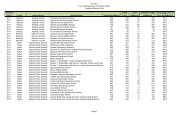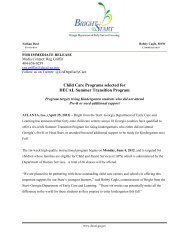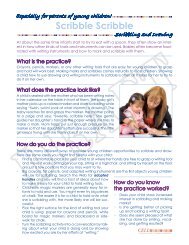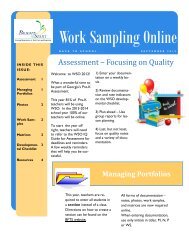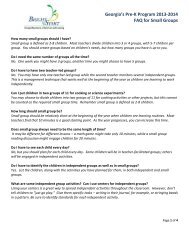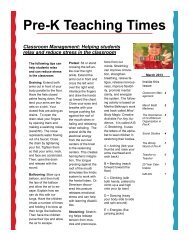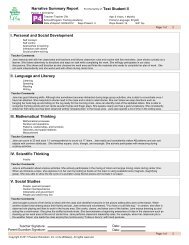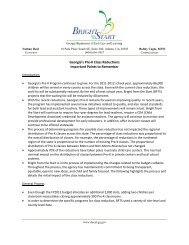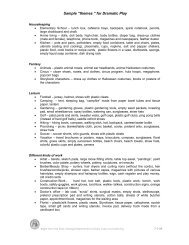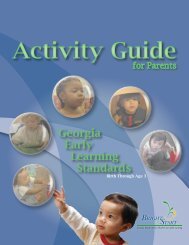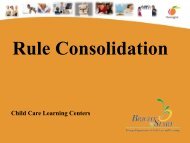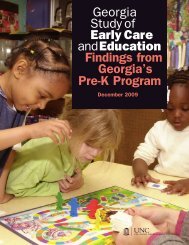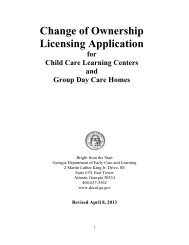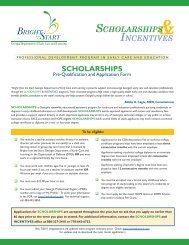Georgia Study of Early Care and Education: Child - Bright from the ...
Georgia Study of Early Care and Education: Child - Bright from the ...
Georgia Study of Early Care and Education: Child - Bright from the ...
You also want an ePaper? Increase the reach of your titles
YUMPU automatically turns print PDFs into web optimized ePapers that Google loves.
14 <strong>Georgia</strong> <strong>Study</strong> <strong>of</strong> <strong>Early</strong> <strong>Care</strong> <strong>and</strong> <strong>Education</strong>: <strong>Child</strong> <strong>Care</strong> Center Findings<br />
Table 10. Highest Degree <strong>and</strong> Major for<br />
Assistant Teachers<br />
Associate’s degree with major in early<br />
childhood<br />
Bachelor’s degree with major in early<br />
childhood<br />
Graduate degree with major in early<br />
childhood<br />
Infant/<br />
Toddler<br />
Preschool<br />
6% 7%<br />
2% 4%<br />
2% 1%<br />
O<strong>the</strong>r education major, any degree 2% 4%<br />
O<strong>the</strong>r non-education major, any degree 8% 12%<br />
No Associate’s, Bachelor’s, or Graduate<br />
degree<br />
81% 70%<br />
Table 11. In-Service Training Topics for<br />
Assistant Teachers in <strong>the</strong> Past Year<br />
About <strong>Child</strong>ren<br />
Infant/<br />
Toddler<br />
Preschool<br />
Health <strong>and</strong> safety practices 77% 74%<br />
Classroom management/discipline 57% 62%<br />
Observing, assessing, <strong>and</strong> documenting<br />
children’s progress <strong>and</strong> development<br />
47% 57%<br />
Social-emotional development 57% 65%<br />
<strong>Early</strong> language <strong>and</strong> literacy 30% 50%<br />
Using a curriculum 53% 59%<br />
Working with children with special needs 34% 43%<br />
Physical activity 40% 57%<br />
Working with children <strong>and</strong> families <strong>from</strong><br />
different cultures <strong>and</strong> races<br />
36% 50%<br />
<strong>Early</strong> science 25% 32%<br />
<strong>Early</strong> math 23% 32%<br />
Working with English Language Learners 19% 31%<br />
About Adults<br />
Managing conflicts in a pr<strong>of</strong>essional<br />
manner<br />
30% 49%<br />
Nutrition education for employees 30% 35%<br />
Wellness education for employees 23% 34%<br />
reported participating in a mean <strong>of</strong> 22 hours <strong>of</strong> in-service training in <strong>the</strong> past year<br />
(median = 10, range = 0 to 180). Twenty-six percent (26%) <strong>of</strong> preschool assistant<br />
teachers reported participating in fewer than <strong>the</strong> 10 hours required by <strong>the</strong> state,<br />
26% reported participating in exactly 10 hours, <strong>and</strong> 47% reported participating in<br />
more than 10 hours.<br />
• Pr<strong>of</strong>essional Development Content: The most common in-service training topic<br />
reported among assistant teachers in infant/toddler <strong>and</strong> preschool classrooms was<br />
health <strong>and</strong> safety practices. Table 11 shows <strong>the</strong> percentage <strong>of</strong> assistant teachers<br />
who participated in in-service training around various topics during <strong>the</strong> past year.



